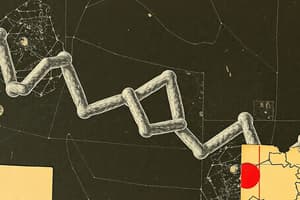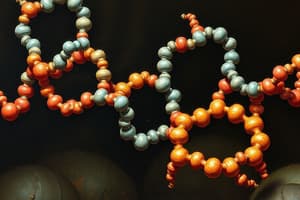Podcast
Questions and Answers
What is the three-dimensional structure of a multisubunit protein called?
What is the three-dimensional structure of a multisubunit protein called?
- Quaternary structure (correct)
- Primary structure
- Tertiary structure
- Secondary structure
Which of the following denaturing agents can lead to protein precipitation?
Which of the following denaturing agents can lead to protein precipitation?
- Hydrophobic interactions
- Heat and pH (correct)
- Covalent disulfide bonds
- Hydrogen bonds and salt bridges
What is the process of refolding an unfolded (denatured) protein to restore its native structure and function called?
What is the process of refolding an unfolded (denatured) protein to restore its native structure and function called?
- Renaturation (correct)
- Aggregation
- Polymerization
- Precipitation
Which type of proteins consist of two separate polypeptide chains or subunits?
Which type of proteins consist of two separate polypeptide chains or subunits?
What percentage of the body weight consists of proteins?
What percentage of the body weight consists of proteins?
The 3D structure of a protein is related to its function. True or False?
The 3D structure of a protein is related to its function. True or False?
What are proteins formed from?
What are proteins formed from?
Where does the amino acid sequence of a protein depend on?
Where does the amino acid sequence of a protein depend on?
Which group of proteins is characterized by a fibrous shape?
Which group of proteins is characterized by a fibrous shape?
Where do polar amino acids tend to be located in a protein's structure?
Where do polar amino acids tend to be located in a protein's structure?
How many main classes are common amino acids divided into based on their properties?
How many main classes are common amino acids divided into based on their properties?
What do nonpolar amino acids constitute in the protein's structure?
What do nonpolar amino acids constitute in the protein's structure?
Which molecular components do proteins serve as?
Which molecular components do proteins serve as?
What is the role of proteins in the body?
What is the role of proteins in the body?
Which type of amino acid has an asymmetric carbon?
Which type of amino acid has an asymmetric carbon?
What term describes compounds that are non superposable mirror images of each other?
What term describes compounds that are non superposable mirror images of each other?
Which functional groups in amino acids function as weak acids and bases?
Which functional groups in amino acids function as weak acids and bases?
What type of bond is formed by removal of the elements of water between two amino acid molecules?
What type of bond is formed by removal of the elements of water between two amino acid molecules?
What is the primary structure of a protein?
What is the primary structure of a protein?
What is the secondary structure that involves a tightly wound helical conformation of a polypeptide chain?
What is the secondary structure that involves a tightly wound helical conformation of a polypeptide chain?
What stabilizes the structure of α-helix in proteins?
What stabilizes the structure of α-helix in proteins?
What is the secondary structure that has an extended conformation of polypeptide chains arranged into a zigzag?
What is the secondary structure that has an extended conformation of polypeptide chains arranged into a zigzag?
In which type of β-pleated sheet do the polypeptide chains run in the same direction?
In which type of β-pleated sheet do the polypeptide chains run in the same direction?
What type of turn involves four amino acid residues and is important in compacted globular proteins?
What type of turn involves four amino acid residues and is important in compacted globular proteins?
What does the tertiary structure of a protein reflect?
What does the tertiary structure of a protein reflect?
What is the characteristic of a zwitterion or dipolar ion?
What is the characteristic of a zwitterion or dipolar ion?
Study Notes
Protein Structure and Function
- The three-dimensional structure of a multisubunit protein is called a quaternary structure.
- Denaturing agents like trichloroacetic acid, phenol, and acetone can lead to protein precipitation.
- The process of refolding an unfolded (denatured) protein to restore its native structure and function is called renaturation.
Protein Composition and Formation
- Proteins consist of two separate polypeptide chains or subunits.
- About 15-20% of the body weight consists of proteins.
- Proteins are formed from amino acids.
- The amino acid sequence of a protein depends on the sequence of nucleotides in the gene that encodes it.
Amino Acid Properties
- Amino acids are divided into two main classes based on their properties: polar and nonpolar.
- Nonpolar amino acids constitute the hydrophobic core of the protein's structure.
- Polar amino acids tend to be located on the surface of a protein's structure.
Functional Groups and Bonds
- The amino and carboxyl functional groups in amino acids function as weak acids and bases.
- A peptide bond is formed by removal of the elements of water between two amino acid molecules.
Protein Structure Hierarchy
- The primary structure of a protein is the sequence of amino acids.
- The secondary structure that involves a tightly wound helical conformation of a polypeptide chain is an α-helix.
- Hydrogen bonds stabilize the structure of an α-helix in proteins.
- The secondary structure that has an extended conformation of polypeptide chains arranged into a zigzag is a β-pleated sheet.
- In a parallel β-pleated sheet, the polypeptide chains run in the same direction.
- A β-turn involves four amino acid residues and is important in compacted globular proteins.
- The tertiary structure of a protein reflects the overall 3D shape of a polypeptide chain.
Chirality and Ions
- An asymmetric carbon atom is found in amino acids with chiral centers.
- Enantiomers are compounds that are non-superposable mirror images of each other.
- Zwitterions or dipolar ions have both positive and negative charges.
Studying That Suits You
Use AI to generate personalized quizzes and flashcards to suit your learning preferences.
Related Documents
Description
Test your knowledge about the characteristics, structure, and classification of amino acids and proteins including peptide bonds, structural protein levels, 3D protein structure, and the relationship between structure and function. Explore the linear polymer formation of proteins from amino acids and their dependence on genetic information encoded in DNA.




